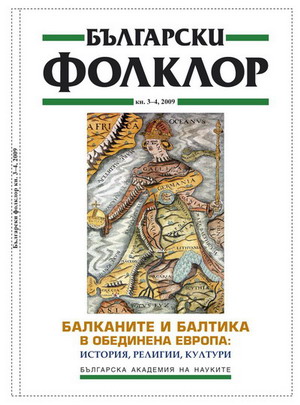Липсващи стереотипи и стереотипи в излишък (Националните стереотипи във всекидневната култура)
Missing Stereotypes and Stereotypes in Excess (National Stereotypes in Everyday Culture)
Author(s): Lina GergovaSubject(s): Anthropology
Published by: Институт за етнология и фолклористика с Етнографски музей при БАН
Summary/Abstract: The ethno-stereotypes combine processes of education and processes of ethnic identity-construction. In this sense, the ethno-stereotypes depend on the culturally formed knowledge at everyday level as well as on the ethnic borders drawn at the same level. However, these two parts of ethno-stereotypes' formation should not be always available but they are mutually connected and we can draw some hypotheses on the base of these reflections. During my fieldwork research among the Orthodox Bulgarians in Plovdiv I noticed “missing” ethnostereotypes – about Baltic peoples or nations, and some ethnostereotypes “in excess” – about Balkan neighbors and “famous” nations (Americans, Frenchmen, Englishmen, Germans, Russians, Chinese, etc.). So, the “other” usually is the closest in the spatial and historical aspects; the “other” always is around the centre of “our” and in continuous contact with us. He is the mirror where we find ourselves. The Baltic people are in the periphery of this process – they are quite distant and unknown and they are not important for our identity. They are not “others” for us in the full sense of the term because they are not significant for “us”. Using this research objects and these hypotheses, it is possible to define a model of the connection between the process of ethnic stereotypes building, distance between communities and world information channels – i.e. not only the media but also the public culture and various forms of art. So the world is not known enough but the whole world is not important for the particular community. The “others” always could be divided in two groups: the neighbours – different in each case, and the “famous nations” which are close to all over the world.
Journal: Български фолклор
- Issue Year: XXXV/2009
- Issue No: 3-4
- Page Range: 092-099
- Page Count: 8
- Language: Bulgarian
- Content File-PDF

